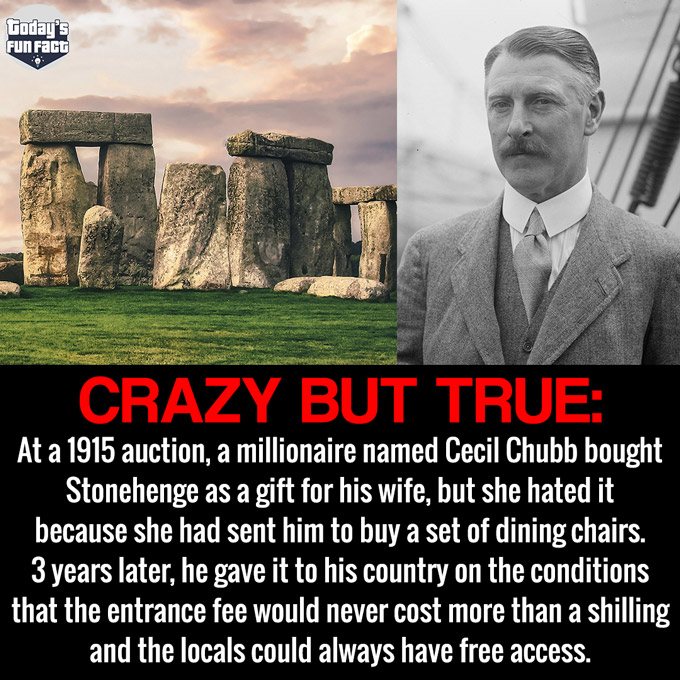
At A 1915 Auction, A Millionaire Named Cecil Chubb Bought Stonehenge As A Gift For His Wife Graphic © todaysfunfact.com. Background photo: Unsplash (PD), Wikipedia (PD)
Stonehenge is one of Britain’s most iconic monuments, a thing of legend dowsed in more questions than answers.
Over the centuries it’s been a source of not only magic, mystery and myth.. but also folly: Here’s a crazy story about Stonehenge you can impress your friends with.
The now UNESCO World Heritage Site that draws in droves of visitors annually was once up for sale at an auction in Salisbury. Cecil Chubb, 39, snapped up the Stonehenge in 1915 for £6,600 before donating it to the British government 3 years later.
A Dining Set Turned Neolithic Relic
The story goes that Chubb was sent by his wife to grab a dining room set. Along the way, he took a detour into Salisbury’s Palace Theatre, where fate would tempt him into one of the most legendary impulse buys of all time.
“Stonehenge with about 30 acres, 2 rods, 37 perches of adjoining downland,” called the auctioneer, Howard Frank. The famous prehistoric monument was up for bidding following the death of its previous owner, Sir Edming Antrobus.
Surprisingly, the opening price of £5,000 did not attract eager bids. The auction dragged on until the gavel fell on Chubb’s £6,600 bid.
Recounting the events that transpired on that fateful day, Chubb told a local newspaper that he lifted his hand for the closing bid on impulse. “While I was in the room, I thought a Salisbury man ought to buy it, and that is how it was done,” he said.
It’s amusing to think that if Chubb had just bought the dining chairs he was supposed to buy, his name might have been lost to history.
A Donation to the British People
Announcing his donation of Stonehenge to the British government, Chubb wrote:
“Stonehenge is perhaps the best known and the most interesting of our national monuments and has always appealed strongly to the British imagination.”
“To me, who was born close to it and during my boyhood and youth visited it at all hours of the day and night, under every conceivable condition of weather…it always has had an inexpressible charm. I became owner of it with a deep sense of pleasure, and had contemplated that it might remain a cherished possession of my family for long years to come. It has, however, been pressed upon me that the nation would like to have it for its own, and would prize it most highly.”
A stipulation in his donation stated that anyone living near Stonehenge should enjoy free admission—a request that is honored to this day – although there were periods in the 1990’s; when Stonehenge was completely closed in a highly controversial move to prevent Summer Solstice free festivals from taking place.
